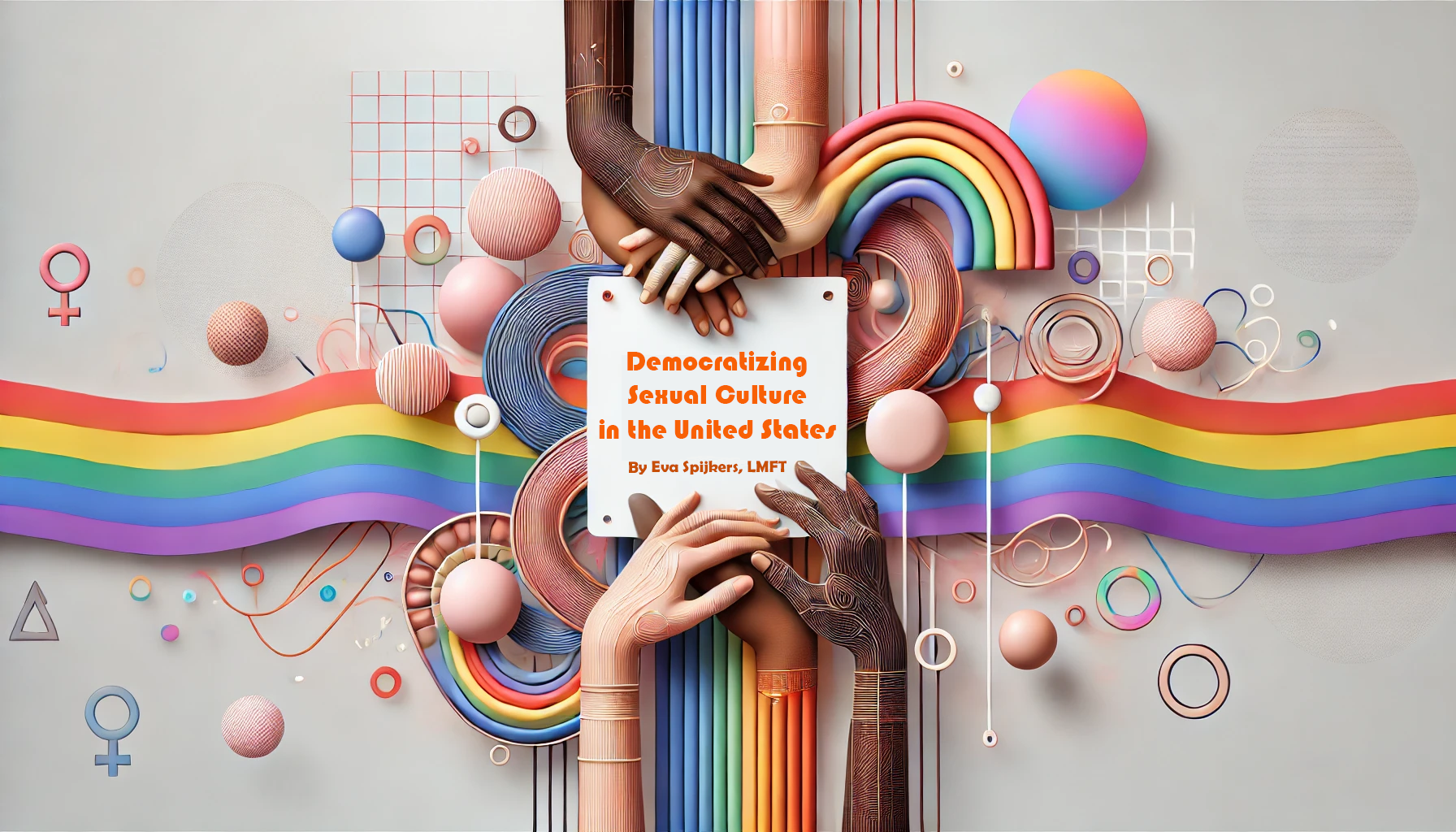Democratizing Sexual Culture in the United States
By Eva Spijkers, LMFT
Sex in America is everywhere—on our screens, in our politics, and increasingly, in our everyday conversations. But while our culture might be more open than ever about sex, that doesn’t mean we’re getting it right. If anything, we’re more confused, conflicted, and divided than ever before.
That’s because America’s sexual culture is at a crossroads. It’s being shaped by everything from TikTok trends and dating apps to shifting gender roles, media messages, and political debates. And while this culture isn’t one-size-fits-all—it varies by community, identity, and region—there are common threads worth examining.
Tech, Tinder, and the Transformation of Desire
Technology has completely changed how we connect, flirt, and form relationships. With a swipe, a match, and a quick emoji-laced message, dating apps like Tinder, Bumble, and Grindr have turned sexual and romantic encounters into something fast, efficient—and sometimes transactional.
Social media platforms and online porn also shape how people understand sex, often setting unrealistic expectations. At the same time, sexting and online content have made sexual expression more accessible—but not without raising concerns about privacy, consent, and objectification.
Pop Culture's Pressure Cooker
Meanwhile, our movies, ads, and Instagram feeds are saturated with hypersexualized versions of femininity and masculinity. Even as representation improves, we’re still seeing damaging ideals around body image and sexual performance. Young people, in particular, feel pressure to live up to these standards—which can lead to anxiety, confusion, and relationships that lack respect, communication, or consent.
Consent Isn’t a Buzzword—It’s a Cultural Shift
Thanks to the #MeToo movement, conversations about consent are finally gaining traction. But we still have a long way to go. Most U.S. states don’t even have a clear legal definition of consent, and too often, it’s still misunderstood as a reluctant “no” rather than an enthusiastic, mutual “yes.”
Affirmative consent—where both parties actively agree to what's happening, and check in throughout—needs to become the norm. That means teaching it early. Schools should introduce comprehensive sex education starting in grade five, right when most kids are entering puberty. And the curriculum should include more than just biology—it should cover communication, boundaries, and respect.
Gender, Power, and the Politics of Pleasure
Sexual culture is inseparable from gender politics. Feminist movements have pushed for equal pleasure, safety, and autonomy for women, but challenges persist—from wage gaps and reproductive rights battles to sexual harassment and assault. These aren’t just “women’s issues.” They’re human rights issues. And they shape how we all experience sex and intimacy.
Movements like #MeToo have also opened the door for women to reclaim their desires. A growing industry of women-led erotica—audio stories, apps, and podcasts—is showing that female pleasure isn’t taboo. It’s powerful.
Visibility Matters—But So Does Justice
We’ve made huge strides in LGBTQ+ visibility. Same-sex marriage is legal. Queer characters are showing up on TV. Conversations about gender identity are more public than ever. But progress isn’t always protection. In many parts of the country, LGBTQ+ people still face discrimination, hostility, or lack of access to basic sexual health resources.
Sexual culture should be inclusive, not just visible. And that requires dismantling systems—like patriarchy and heteronormativity—that continue to exclude and marginalize.
Democratizing Sex: What It Really Means
So where do we go from here? We start by democratizing sexual culture.
That means making space for everyone—regardless of gender, sexuality, race, or background—to have safe, respectful, and empowered sexual lives. It means ensuring access to sexual health care and education, especially in underserved communities. It means normalizing open conversations about sex, even (especially) the uncomfortable ones. It means creating policies that protect sexual rights and reproductive freedom. It means listening to and uplifting the voices of those who’ve been excluded for too long.
A democratic sexual culture doesn’t mean we all think, act, or desire the same way. It means we respect each other’s differences. It means we value consent, autonomy, and joy over shame, silence, and coercion.
So, What Can You Do?
Start talking. Normalize conversations about sex and consent with your friends, family, and partners.
Support inclusive sex education. Advocate for comprehensive, affirming sex ed in your local schools.
Challenge toxic norms. Whether it’s calling out sexism, rejecting purity culture, or supporting LGBTQ+ rights, small actions matter.
Vote. Support leaders and policies that prioritize sexual rights, access to health care, and education.
At the end of the day, democratizing sexual culture is about freedom—not just the freedom to have sex, but the freedom to say no, to ask questions, to seek pleasure, to be fully seen.
Because everyone deserves to feel safe, respected, and empowered in their bodies and their desires.
Posted on 1/18/2025

